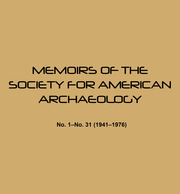Article contents
Some Adena and Hopewell Radiocarbon Dates
Published online by Cambridge University Press: 27 June 2018
Extract
The Chronological relationship of the Adena and Hopewell cultures and their placement within the temporal column of North American prehistory was considered of sufficient importance by the Committee on Radioactive Carbon 14 to warrant a special effort to obtain dates. Individuals and institutions in the Mississippi Valley were requested to provide samples, with the result that specimens were submitted from an Adena site in Kentucky (126) and one in Ohio (214). Two specimens from a Tchefuncte culture midden in Louisiana thought to be of comparable age and typology to Adena (150 and 151) were processed in order to provide information on a common cultural level over a considerable area. A total of six specimens from the Hopewellian level were dated. These comprise runs on three different kinds of organic material from mound 25 of the Hopewell group (137-139), Ross County, Ohio; a specimen from mound 9 of the Havana group in Mason County, Illinois (152); material from Bynum, a Hopewell period site in northeast Mississippi (154); and from the Crooks site, a Marksville mound in LaSalle Parish, Louisiana (143). It was believed, before the samples were dated, that this would afford satisfactory information not only on the time position of Adena and Hopewell but might also clear up the question as to the priority of appearance in the north or the south of those cultural influences which produced the general stages of early to middle Woodland and their local representations.
- Type
- Research Article
- Information
- Copyright
- Copyright © Society for American Archaeology 1951
- 1
- Cited by


